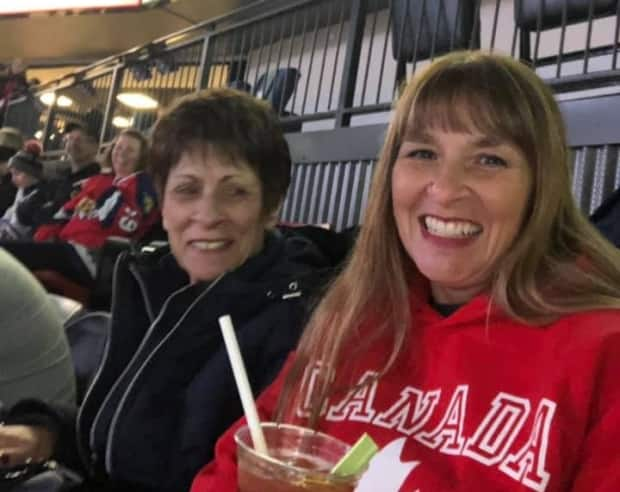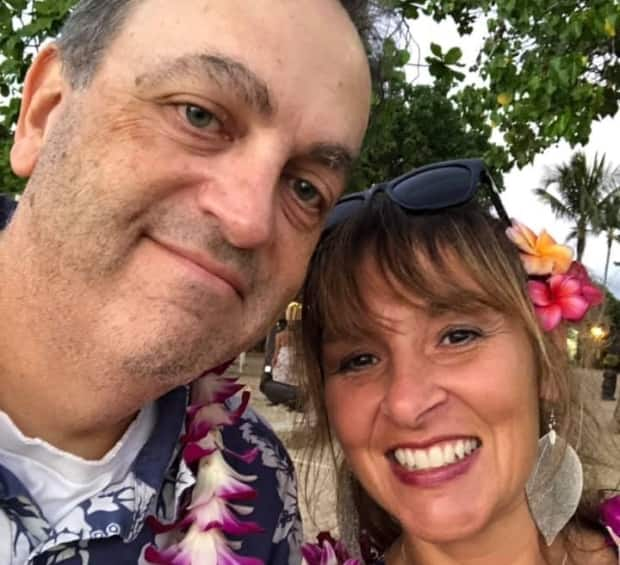Province won't expand compassionate travel exemptions to care for seriously ill

Paulette LeBlanc's 75-year-old mother began six weeks of chemotherapy this week.
Since her mom's diagnosis four weeks ago, LeBlanc is consumed with trying to get back to her childhood home in Dieppe to help care for her mother.
"It's all I've thought about since my mom got diagnosed," she said from her home in Hawaii.
But because Félice Cormier isn't considered palliative, her daughter doesn't qualify for the New Brunswick government's exemptions on compassionate grounds.
"I'm not looking for them to open the borders wide open or anything — just loosen the compassionate travel," she said.
"The compassionate care mandate is way too strict. The immediate family member must be end-of-life or in a coffin in order for family to obtain permission to enter Canada."

LeBlanc said she understands the need to protect the citizens of the province but said it's not as though she plans to rush directly to her mother's side as soon as she arrives.
"We are not looking to avoid quarantine. We know you have to quarantine for 14 days when you enter."
It's not like she broke her arm, and I feel bad and I want to go help her do the dishes. She has cancer, and she's going to be going through some tough times . - Paulette LeBlanc
They made arrangements to self-isolate in a family member's empty residence and planned to follow all of the government's rules about coming to the province.
Plus, she and her Moncton-born husband are both fully vaccinated.
LeBlanc said radiation treatments that started this week have been difficult for her mother, and she worries about her being along in her weakened state. Her father died in 2018 and most of her family lives in Massachusetts.
There is no one to provide around the clock supervision and LeBlanc worries about her mother falling and not being able to summon anyone for help.
"It'd be a while before someone was to find her. So I feel helpless. I'm far away ... so as her daughter, I feel totally helpless."
LeBlanc said she could have been part of the at-home care for her mother.
"I'm not going there for a birthday party or a reunion. It's not like she broke her arm, and I feel bad and I want to go help her do the dishes. She has cancer, and she's going to be going through some tough times and some strong medications."
LeBlanc applied for a visit on compassionate grounds, but was denied — twice.
She'd like to see the province expand its exemptions to include those who are seriously ill.
Province not contemplating changes
Changes in the campassionate exemption rules aren't likely to happen until more people are vaccinated, said Brunce Macfarlane, a spokesperson for the Health Department.
"At present, the compassionate program allows for immediate family members to visit for palliative/end of life and funeral only, and not to care for very ill family members," he said in an email.
On Thursday, the province's chief medical officer of health said now is not the time for New Brunswick to expand exemptions.
Dr. Jennifer Russell said the coronavirus variants have made travel from outside the province even riskier.
"So as much as people are finding it challenging right now to have these rules in place, we do need to maintain them until we get the majority of our population vaccinated with two doses of the vaccine.
"Because if we relax any restrictions or rules between now and then, we can have increased numbers of cases that would require hospitalization and ICU admission, and we could have a larger number of deaths."
Caregivers play 'essential' role
The Canadian Cancer Society would like to see loved ones involved in the care of cancer patients.
"We certainly see caregivers as a central part of the health-care system and as a part of the care continuum for cancer patients," said Kelly Wilson Cull, director of advocacy for Atlantic Canada for the organization.
"What we're asking governments to do is to recognize caregivers as an essential part of the health-care team, and to look at and develop safe practices that allow them to accompany their loved one to cancer treatments and appointments."
Wilson Cull stopped short of suggesting governments should ease restrictions. She said the prevalence of COVID-19 varies among provinces, and governments have responded to their unique situations.
Where is the palliative line drawn?
According to the province's website, "The Canadian Red Cross has been authorized to approve travel into New Brunswick for end-of-life visits with an immediate family member."
Bill Lawlor, the provincial director for New Brunswick and Prince Edward Island, said the Red Cross has the power to grant permission only to those coming from within Canada.
As long as the applicant is considered an immediate family member and has been told by their loved-one's doctor — or another qualified medical official — that the person is "palliative," they are approved to continue the application process, which includes submitting an acceptable isolation plan.

They do not have to provide written evidence from a medical professional to prove the person is palliative, said Lawlor.
"We do not make that determination," he explained.
"The determination is made that if a member of the palliative care team or a physician or … whoever is looking after that loved one who has now been determined to be in the palliative state, that's the requirement. We don't try to interpret precisely what that means."
Proof required in Nova Scotia
Nova Scotia, where travel restrictions and exemptions for end-of-life visits are similar to New Brunswick's, does require proof.
Anyone applying for permission to visit someone at the end of their life has to provide "written confirmation (or email) from your immediate family member's care team that your family member is near end-of-life and that you have been given permission to visit, if applicable," according to Nova Scotia's online information for COVID-19 travel.
A media relations adviser for Nova Scotia's Department of Justice said decisions are made on a case-by-case basis.
Not just palliative in PEI
Prince Edward Island doesn't limit end-of-life visits to palliative cases, said Everton McLean, a spokesperson for Health PEI.
"Compassionate visitors should be considered for patients/residents with acute, life-threatening illnesses, not solely palliative care patients/residents," McLean explained by email on Friday.
"The patient or residents' primary/attending physician or nurse practitioner will determine in collaboration with the care team if the patient/resident is at end of life."
In technical terms, he said, a score of 40 per cent or less on the Palliative Performance Scale may be used as a guide.
Even if a person is approved for travel on compassionate grounds, McLean said, visitors still have to follow strict rules that include testing and self-isolation at all other times than approved visiting times.

Once approved for end-of-life visits in New Brunswick, travellers still have to abide by similar rules, including 14 days of self-isolation.
But if the loved one's condition deteriorates rapidly, Lawlor said exemptions can be made to allow the immediate family member to come out of isolation to visit the person.
"I can say that with absolute confidence that any time we have been presented with one of these circumstances … [Public Health officials] have certainly made it a top priority to work with the family, and to facilitate as safely as possible, that visit prior to the loved one passing away."

